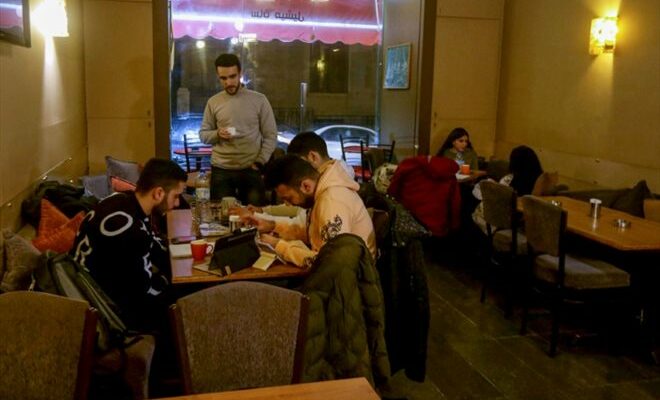Owner Ihsane al-Azmeh (d) prepares coffee in his establishment in Damascus, January 30, 2023 in Syria (AFP/LOUAI BESHARA)
For the past year, a café in central Damascus has become Majida’s office: she goes there almost every day to work and organize meetings, taking advantage of the electricity and an internet connection.
In Syria, exhausted by a war that has lasted for almost thirteen years, the capital cannot escape severe power rationing, which reaches twenty hours a day, even in the middle of winter.
“I work in advertising. I need electricity all the time,” said Majida, 42, who did not want to give his last name.
She took over a sofa where she spread out her belongings, and is now part of the Flow Space café family, playing with the owner’s dog, Lily, and even sometimes helping the staff.
“If there were no cafes, I would have stopped working,” she adds.
Around her, students and employees seated at a long wooden table or in armchairs work quietly on their computers or are immersed in books.

Owner Ihsane al-Azmeh (l) prepares coffee in his establishment in Damascus, January 30, 2023 in Syria (AFP/LOUAI BESHARA)
In every corner, power outlets are installed to power computers and mobile phones.
Ihsane al-Azmeh, 38, says he opened his establishment about four years ago, after seeing the difficulty of finding a place to work in the Syrian capital where deprivations accumulate.
“I have electricity here all the time, and the café is heated,” explains the owner, who has equipped his establishment with an electric generator and batteries.
– “It’s not a choice” –
“Like everyone else, I suffer from electricity and transport problems, and I often sleep in a café instead of going home,” adds the young man.
He set up a corner in his establishment, located in a lively area in the heart of Damascus, so that he could sleep there.

View of Sabaa Bahrat Square in Damascus, January 9, 2024 in Syria (AFP/Archives/LOUAI BESHARA)
Transport prices have more than doubled since the government lifted gasoline subsidies last August.
The war in Syria, which broke out in 2011 with the repression of pro-democracy demonstrations, has left more than half a million dead, displaced millions of people, and ravaged infrastructure.
The economy has collapsed under the weight of Western violence and sanctions, and oil and gas fields are now mostly in areas beyond the control of central power.

(AFP/LOUAI BESHARA)
In the Bab Touma district known for its traditional houses and restaurants, three students study diligently before their exams in a café.
“Coming to the café is not a choice, but a necessity. Here, we have electricity and internet,” says Georges Ksara, 18, who studies computer science at Damascus University.
“As soon as I arrive, I take out all my devices to charge them, and sometimes I even bring my sister’s devices,” he adds, sitting with two of his friends.
– “Nothing lasts” –
Next to them, Mohammad Sbahi, 22, is preparing to start a work meeting on his computer.

Mohammad Sbahi works on his laptop in a cafe in Damascus, January 30, 2023 in Syria (AFP/LOUAI BESHARA)
“I work remotely with a company in the Gulf, and I come to the café every day,” explains the young man. “I even have a reserved seat and the waiters know what my favorite drink is!”
His bag is overflowing with chargers and batteries. “Without this coffee, I would have failed at university and lost my job,” he says. “It’s the only solution for me, and for many of my friends.”
Chadi Elias tried to study at home. But this 18-year-old medical student, who lives in eastern Damascus, must have quickly become disillusioned.

Students study in a cafe in Damascus, January 30, 2023 in Syria (AFP/LOUAI BESHARA)
“Nothing lasts with the long hours of rationing,” he explains, pointing to the rechargeable electric lamp that he hangs from the ceiling.
He points out that cafes are crowded during exam periods. “That’s why I come early,” to get a place, said the young man.
“The place becomes like a classroom, we pass around pens, books and papers, and sometimes even phone chargers,” he adds with a smile.
© 2024 AFP
Did you like this article ? Share it with your friends using the buttons below.




